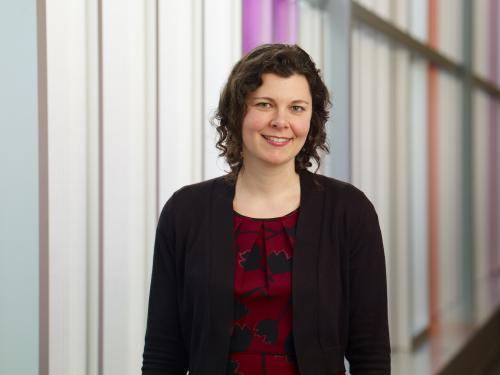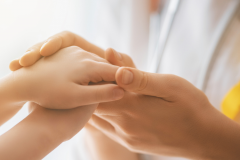At BC Children’s Hospital, psychologist and investigator, Dr. Jennifer Coelho, studies the experiences of young people with eating disorders to improve diagnosis and treatment. Dr. Coelho talks about the importance of eating disorders research and how patient participation is key to improving care for these common and serious conditions.
What do people need to know about eating disorders?
Eating disorders, including anorexia nervosa, bulimia nervosa and binge eating disorder, are a group of mental health conditions that cause serious disturbances in eating patterns and may include extreme concern about body weight and shape.
There’s a common stereotype that eating disorders only affect young women. In fact, these conditions affect people of all ages and genders.
The 2013 BC Adolescent Health Survey showed significant rates of disordered eating in both males and females: 35 per cent of females reported binge eating in the last year and 10 per cent reported having vomited. For males, 19 per cent reported binge-eating and five per cent reported vomiting.

In fact, one of your main research projects is on eating disorders in males. Tell us about this research and why it’s important.
Fewer than 10 per cent of people admitted to eating disorder treatment centres are males, but research suggests the actual prevalence of males with eating disorders is higher. Girls and women are more likely to enter treatment so the vast majority of eating disorders research focuses on females.
We did a study a few years ago on males who had been admitted to the inpatient eating disorders unit at BC Children’s and found 80 per cent had excessive exercise as a symptom. Doctors are using this information to understand eating disorder symptoms in men and boys, but it’s just the beginning. We still have a lot to learn about the symptoms of eating disorders in males, how the conditions progress and how many clients recover.
We’re currently doing a study with support from the Swiss Anorexia Nervosa Foundation where we invite all the boys and men who are admitted to BC Children’s and the Looking Glass Residence for eating disorders treatment to fill out questionnaires about their symptoms. We’ll then track the participants’ physical health during treatment and follow up. We’ll conduct interviews on their experiences of having an eating disorder, getting diagnosed and going through treatment and recovery. We’re inviting a group of females and a group of people who don’t identify with their assigned sex at birth to participate in this study as well. Our goal is to understand how eating disorders affect young people across the gender spectrum so we can help them overcome challenges to recovery and create treatment plans tailored to individual needs.
What else are you working on?
We have a few other projects on the go that are following clients through treatment and beyond, so we can examine how factors like a client’s eating disorder symptoms and motivation to recover at the beginning of treatment impact long-term outcomes. The ultimate goal of these studies is to develop data that will help us decide whether outpatient treatment, residential treatment or inpatient hospitalization is the best fit for an individual.
In one study of clients admitted to BC Children’s, we’ve found that youth who are very underweight can be successfully treated through outpatient family-based treatment. We used to think that inpatient treatment was needed for these individuals, but more and more, we’re understanding that parents are the experts on their children and are essential for the recovery of children and adolescents with eating disorders. When parents take on the task of helping their child recover from an eating disorder, we see significant improvements in the health and well-being of children and adolescents.
Why is research important for young people affected by eating disorders and their families?
When I sit down with families at the beginning of treatment, they often ask me, “How likely is it that my child will recover? Is this going to be a lifelong condition?” We need to do research to be able to answer these questions.
We want to be able to provide families with evidence-based information to help them understand their child’s diagnosis and prepare for the future.
Research also helps us improve care and tells us whether or not treatments are working. Thanks to research, we know that family-based treatment, the primary intervention we use at BC Children’s Eating Disorders Program, is effective. Now we can confidently recommend family-based treatment to clients and families as the intervention that’s most likely to lead to recovery based on available evidence. When a client does need a more intensive treatment like residential care or hospitalization, research can help guide our decision-making so we match each client with the intervention that’s most likely to help them.
I would like people with eating disorders and their families to know how much we value their participation in research. I know it can be difficult to take the time to fill out a questionnaire or sit for an interview, especially if you have to share painful experiences. These contributions really do make a difference and can help us improve care for eating disorders.
Is there anything about eating disorders you’d like to share with the general public?
Eating disorders are serious conditions that have one of the highest mortality rates of any psychiatric disorder. If you’re concerned about your child, don’t wait to get help. Talk to your family doctor and go to the Kelty Mental Health website to see what resources are available in your area. Unfortunately, for some individuals with eating disorders, denying they have a problem may be a feature of the illness. Sometimes it takes support from others for young people to recognize they need help and start their journey towards recovery.




